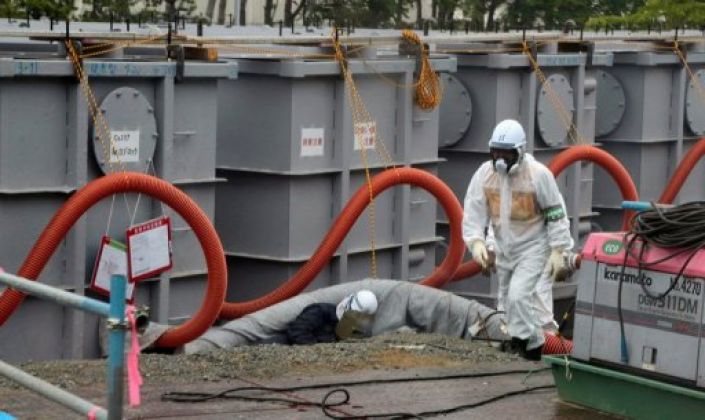
Waste water tanks at Fukushima Dai-ichi Nuclear Power Plant (AFP)
Tokyo Electric Power Co has warned some toxic liquid may have flowed into the ocean, according to an AFP article by Shingo Ito. Around 300 tons of toxic liquid was believed to have escaped from one of the tanks that hold water used to cool the broken reactors. TEPCO workers are scrambling to check for leaks in 300 other tanks.
“We are hurriedly checking if some 300 tanks of the same type holding contaminated water have the same leak problem,” TEPCO spokesman Tsuyoshi Numajiri said. “We have finished pumping out water from the troubled tank, while we have continued removing the soil soaked by the water. We cannot rule out the possibility that part of the contaminated water flowed into the sea.”
According to this Reuters article, TEPCO has been criticized for its failure to prepare for the massive 2011 tsunami and earthquake that devastated its Fukushima plant and blasted for its inept response to the reactor meltdowns. It has also been accused of covering up shortcomings.
Shinji Kinjo, head of a task force within the Nuclear Regulatory Authority (AKA the “other NRA”), said TEPCO’s “sense of crisis is weak.” He said TEPCO alone shouldn’t be left to handle the emergency.
I agree TEPCO shouldn’t be left to deal with the crisis alone. The problem is that TEPCO bears the blame for its failure to prepare for the 2011 tsunami and its own botched response. However, as we have seen over the past two and a half years, TEPCO isn’t adept at handling the disaster, either out of incompetence or lack of commitment. On July 31, 2012, TEPCO was substantially nationalized after receiving 1 trillion yen ($12.5 billion) from the Nuclear Damage Liability Facilitation Fund, a government-backed support body. At 50.11 percent, the Fund holds the majority of the company’s voting rights. However, up to that point, the company may not have dedicated sufficient resources to the clean-up, as they would have to keep both the bottom line and the company’s future in mind. The Japanese people, on principal, may not like the idea of their tax yen going to pay for a private company’s screw ups. But the Japanese may pay a high price for their principal.